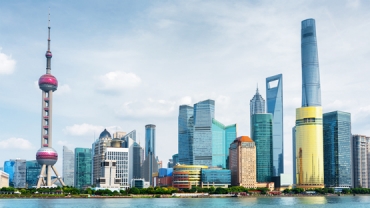
Hard Science & Soft Power – Contrasting Great Power Vaccine Approaches - PwC China Compass
02 December, 2020
In late 2002, a mysterious pneumonia-inducing virus was discovered in Foshan, China. This deadly virus – known as SARS-CoV or simply SARS – was quickly put under control after only 8,000 known infections and was declared as contained by the World Health Organisation (WHO) by July of 2003.

Fast forward almost exactly 18 years, and similar early scenes emerged in Wuhan. The new virus, SARS-CoV-2, has much in common with its predecessor. Both viruses have similar structure, symptoms, and means of transmission. Yet they also differ in important ways: the first SARS might have been much deadlier than today’s coronavirus, but it was also less contagious. SARS could be quickly controlled via conventional containment measures of track-and-trace; the same cannot be said for today’s coronavirus, which has spread globally to even the remotest territories. It’s been clear for some time now that only a vaccine can sustainably end the ongoing pandemic.
Accordingly, scientists around the world rushed to develop a vaccine in unprecedented circumstances and record time. Initially, there was little reason for optimism that a vaccine would be found quickly – after all, it’s common for vaccine development to take well over a decade, and a vaccine for SARS was never found. Indeed, it was not immediately clear that a vaccine against the novel coronavirus could be made at all. Parallels were drawn to other viruses which have so far eluded vaccine makers, and optimistic announcements of short vaccine development timelines were viewed skeptically. For example, it was predicted in 1984 that an HIV vaccine would take only two years to develop; as of writing, there is still no vaccine in sight.
The (western) world breathed a long sigh of relief when BioNTech, a company based in Germany, and Pfizer from the US, recently revealed early results indicating that their vaccine is over 90 percent effective, in what experts called a “light at the end of the tunnel”. The BionTech/Pfizer vaccine was developed based on a new technology, the so-called mRNA or Messenger RNA.This news sent global financial markets soaring and, for the first time, implied a credible return to normality in the foreseeable future. Only a couple of days later, Moderna, also a US-based company announced that their vaccine, using a similar technology, has also reached over 94 percent effectiveness. Most recently, the Oxford / AstraZeneca vaccine has proven an effectiveness of up to 90 percent at a certain dosage.
Yet when one takes a step outside of the western world, one realises that while these vaccines might be one of the most promising, they are certainly not the first. In China, CanSino cooperated with the military to produce the adenovirus-based Ad5 vaccine. It’s been supplied to Chinese military (the first Covid-vaccine to be supplied to any military) since summer after receiving rapid approval as a “specially needed drug”. However, members of the People’s Liberation Army haven’t been the only recipients of experimental vaccines: ordinary citizens, in the hundreds of thousands (figures are rather opaque), have been receiving jabs from SinoVac, another Chinese vaccine maker, on a first-come, first-served basis at least since October. None of these vaccines have yet passed phase-III trials (in fact, SinoVac’s Brazil trials have recently been halted on safety concerns), and commentators have lamented significant health risks involved in this rapid endeavour. After all, rushed efforts at immunization have a poor historical track record; in 1976, a bad vaccine against the swine flu in the USA resulted in a small share of vaccine recipients developing chronic fatigue syndrome. It is exactly such events that undermine faith in vaccines, a faith that is crucial when global public health is on the line.
Meanwhile, in Europe, no vaccines have yet been approved, despite promising early trial results (indeed, BioNTech/Pfizer have submitted a US FDA emergency approval before filing in Europe). This is due to Europe’s highly developed regulatory system and an acute awareness of the dangers of a premature vaccine release.
In some ways it is remarkable that China, which has the virus virtually under control, is aggressively pushing ahead with a vaccine while Europe, ravaged by an out-of-control pandemic, is taking a slower, more prudent approach. Europe (EU, UK, EEA) is approaching a staggering 13 million confirmed cases (as of November 25th) while China is only seeing low double-digit daily confirmed cases, an impressive feat for a population of almost 1.4 billion people. Given these numbers, in both Europe and China, the risk-reward ratio with regards to vaccine development seems off. But this vaccine is about much more than ‘just’ public health – it's also an issue of public relations. China’s soft power has taken a severe hit on allegations that Beijing did not do enough to suppress the spread of the virus and even silenced crucial news of the initial outbreak. Now, China is trying to rebuild its reputation as the country offering life-saving PPE to the world – and also a life-saving vaccine. This is why the People's Republic has already signed vaccine deals with numerous developing countries, and President Xi Jinping has promised to make the Chinese vaccine a “global public good”.
While much divides Europe and China these days, including their approaches to vaccine development and testing, they are united in their commitment to multilateralism. The EU and China are the only great powers to sign on to COVAX, a global initiative to supply vaccines to the developing world (notable omissions include the USA and Russia). And even in a best-case scenario where both eastern and western vaccines are effective (which would be an historic feat by any measure), we will still need plenty more east-west cooperation on matters such as trade and knowledge-sharing before this pandemic is put under control globally – perhaps now more than ever.
Chenchao Liu is the CEO of SILREAL, a consulting firm enabling companies to enter, expand and find strategic partners in China and Europe in the healthcare sector. By capitalizing on his extensive insights about China and its relationship with Europe, Mr. Liu combines his expertise in healthcare and his intercultural competencies to enable companies to excel on both sides.









